Post by cofi on Sept 10, 2007 20:19:21 GMT
Another great band from the 60s, that was great to listen to when at party's, or under the influence of certain thing's, or mushrooms, and not the once you eat with breakfeast 
Ahh the good old day's,

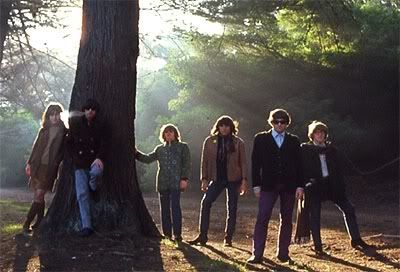
Jefferson Airplane is regarded as the most successful San Francisco band of the late 60s, despite countless personel and even name changes. The group was formed in August 1965 by guitarist Marty Balin, when he teamed up with guitarists Paul Kantner and Jorma Kaukonen, vocalist Signe Anderson, drummer Alexander ‘Skip’ Spence and bassist Jack Casady. Kantner was already a familiar face on the local folk circuit as was Balin, formerly of the Town Criers and co-owner of the Matrix club. The band soon became highly popular locally, playing gigs and benefits organized by promoter Bill Graham. Eventually they became regulars at the Fillmore Auditorium and the Carousel Ballroom, both a short distance from their communal home in the Haight Ashbury district. With the San Francisco music scene in full blossom, record companies engaged in a bidding war for local talent, and Jefferson Airplane became one of the first to sign a major record contract with RCA for an unheard of sum of $25,000. As the year ended, the band, a mere four months old, began work on its first album.
Shortly after the release of their moderately successful debut LP, "Jefferson Airplane Takes Off", (#128 on the Billboard Hot 200) Skip Spence was fired for missing too many rehearsals and replaced by Spencer Dryden. Signe Anderson became pregnant and also departed. She was replaced in October 1966 by Grace Slick. (real name: Grace Barnett Wing) Slick was already well known with her former band, the Great Society, and brought two of their songs, 'White Rabbit' and 'Somebody To Love' to the Airplane. Both titles were on their second influential collection, "Surrealistic Pillow", and both became U.S. Top 10 hits. They have now achieved classic status as definitive songs from that era.
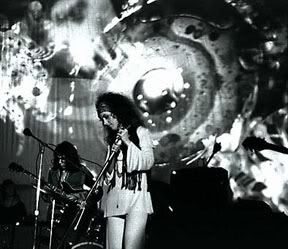
The band's reputation was enhanced by a strong performance at the legendary Monterey Pop Festival in 1967. This national success continued with the erratic "After Bathing At Baxters" and the brilliant "Crown Of Creation". The latter showed the various writers in the band maturing and developing their own styles. Balin's 'If You Feel', Kaukonen's 'Ice Cream Phoenix' and Slick's tragi-comic 'Lather' gave the record great variety. This album also contained 'Triad', a song their friend David Crosby had been unable to include on a Byrds album. They maintained a busy schedule and released a well-recorded live album, "Bless Its Pointed Little Head", in 1969. The same year, they appeared at another milestone in musical history: the Woodstock Festival. Later that year, they were present at the infamous Altamont Festival, where a group of Hells Angels killed a young spectator and attacked Balin.
Slick and Kantner had now become lovers and their hippie ideals and political views were a major influence on the album, "Volunteers". While it was an excellent album, it marked the decline of Balin's role in the band. Additionally, Dryden departed and the offshoot band, "Hot Tuna" began to take up more of Casady and Kaukonen's time. Fiddler "Papa" John Creach joined the band full-time in 1970, although he still continued to play with Hot Tuna. Kantner released a concept album, "Blows Against The Empire", bearing the name Paul Kantner And The Jefferson Starship. The 'Starship' consisted of various Airplane members, plus Jerry Garcia, David Crosby and Graham Nash. This majestic album was nominated for the science fiction Hugo Award. Slick, meanwhile, gave birth to a daughter, China, who later in the year graced the cover of Slick And Kantner's album, "Sunfighter".
Following a greatest hits selection titled, "The Worst Of Jefferson Airplane" and the departure of Marty Balin, the band released the cleverly packaged "Bark". Complete with brown paper bag, the album offered some odd moments, notably Slick's 'Never Argue With A German', sung in spoof German, and new drummer Joey Covington's 50s-sounding a cappella 'Thunk'. It also marked the first release on their own Grunt label. The disappointing "Long John Silver" was followed by a gutsy live outing, "30 Seconds Over Winterland".

Soon afterwards, Kantner and Slick separated; she moved in with Skip Johnson, the band's lighting engineer, and eventually married him. Later that year, Slick was regularly in the news when her drinking problems got out of control. "Spitfire and Earth" continued the band's success, although they had now become a hard rock outfit. Meanwhile, "Count On Me" became a U.S. number 8 hit and "Runaway" reached number 12 in 1978. That same year, Slick was asked to leave the band, only to be allowed to return when she dried out.
"Freedom From Point Zero" and the U.S. number 14 hit "Jane" at the end of 1979, bore no resemblance to the musical style towards which remaining original member Kantner had attempted to steer them. He suffered a stroke during 1980, but returned the following spring together with a sober Grace Slick. Both "Modern Times" (1981) and "Winds Of Change" (1982), sold well, although by now the formula was wearing thin. Kantner found his role had diminished and released a solo album later that year. He continued with the Airplane throughout the following year, although he was openly very unsettled.
Towards the end of 1984, Kantner performed a nostalgic set of old Airplane songs with Marty Balin's band, amid rumours of a Jefferson Airplane reunion. The tension broke in 1985 when, following much acrimony over ownership of the band's name, Kantner was paid off and took with him half of the group's moniker. Kantner claimed the rights to the name, although he no longer wanted to use the title, as his reunion with Balin and Casady in the KBC Band demonstrated.
In defiance, his former band performed as simply, "Starship", but by this time only Grace Slick remained as an original member, after the incredible changes of the previous few years. The new line-up added Denny Baldwin on drums and recorded 'Knee Deep In The Hoopla' in 1985, which became their most successful album. Two singles from the album, 'We Built This City' (written by Bernie Taupin ) and 'Sara', both reached number 1 in the USA.
The following year, they reached the top spot on both sides of the Atlantic with the theme from the film "Mannequin", with 'Nothing's Gonna Stop Us Now'. Their image was now of slick perpetrators of Adult Pop, performing immaculate music for the MTV generation (on which China Kantner was a presenter). Now, having gone full circle, Grace Slick departed in 1989 to join Kaukonen, Casady, Balin and Kantner to tour as the Jefferson Airplane.
The group was not well received by the record buying public and sensing that their popularity had slipped considerably, Casady and Kaukonen again re-formed Hot Tuna, and Kantner was left to rebuild his "Starship" after Grace Slick announced that she was leaving the music business.

Retirement, however has not been very kind to Slick. In 1993, her house overlooking Mill Valley golf course was gutted by a fire started by sparks from a gate being welded by Marin County workers. Lost in the fire was her personal collection of memorabilia and several studio tapes. Three firefighters were fired after they were caught stealing items from the scene.
In 1994, Grace was arrested at her new home in Tiburon, CA, for threatening police, who were investigating a report of gunfire. She was released on $7,000 bail and, after agreeing to a plea bargin, entered a detoxification programme to control a recurrance of her alcohol problem. Apparently, she had begun drinking again (after several years "dry") following the fire at her last home, and had decided on a bit of indoor target practice.
The same year brought further tradgedy when Papa John Creach died from pneumonia after suffering a heart attack during the Los Angeles Earthquake.
After "Starship" had run it's course in the early 90s, Kantner revived the 'Jefferson' Starship name and he hooked up with ex-companion Jack Casady, ex-Tubes drummer Prairie Prince, and alternating vocalists Signe Anderson (from the very first Airplane) and Darby Gould. Later on in 1992, Marty Balin rejoined.
The band began touring extensively and in 1995, Jefferson Starship released the live album, "Deep Space/Virgin Sky", a tribute album to Papa John. Since spring 1995, Diana Mangano took Anderson's place as the female vocalist of the group, and in May 1996, ex-Dixie Dregs keyboardist T Lavitz signed on.
In 1996, Jefferson Airplane were inducted into the Rock and Roll Hall of Fame in Cleveland. Grace Slick, unable to travel for medical reasons, declined the invitation to attend, and instead, sent a rude note containing many four-letter words.
In the next few years, the rest of Jefferson Starship toured extensively, both electric and acoustic. Their album "Windows of Heaven" was released in February, 1999, and in August, 2003, re-mastered versions of the first four Jefferson Airplane albums were issued.
The band, in its various forms and names, has performed over 700 concerts in 16 countries in their 35 years in existance.
In January, 2005, drummer Spencer Dryden passed away after a long battle with colon cancer.
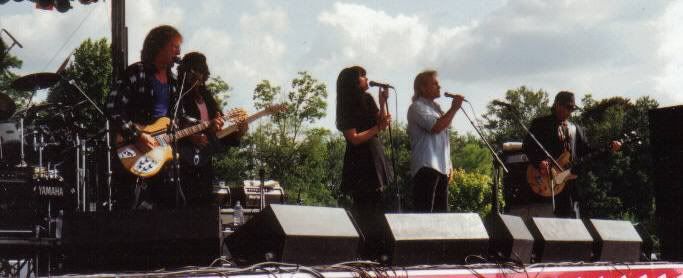

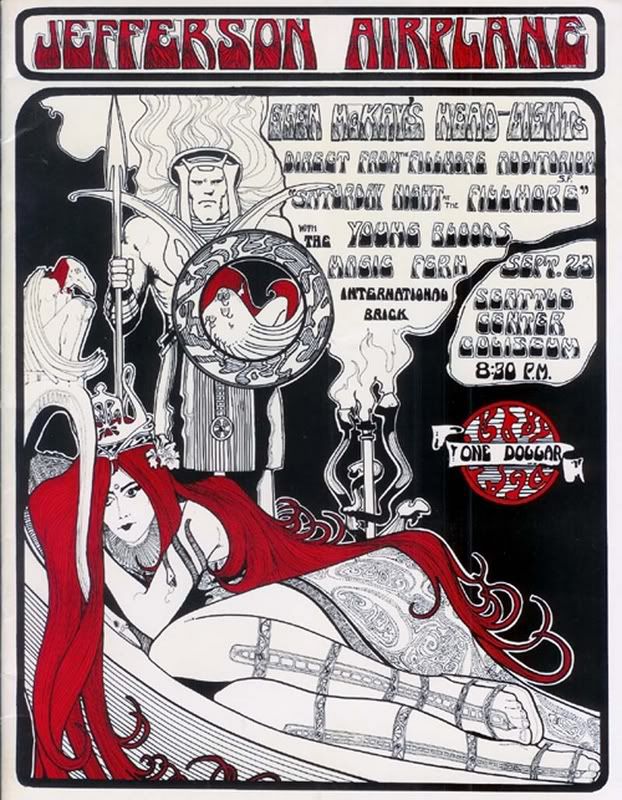
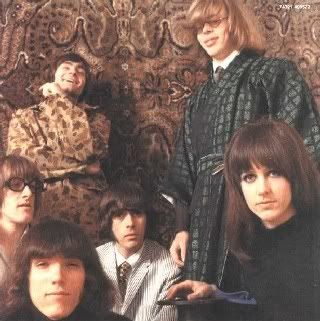
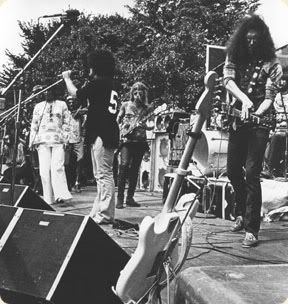
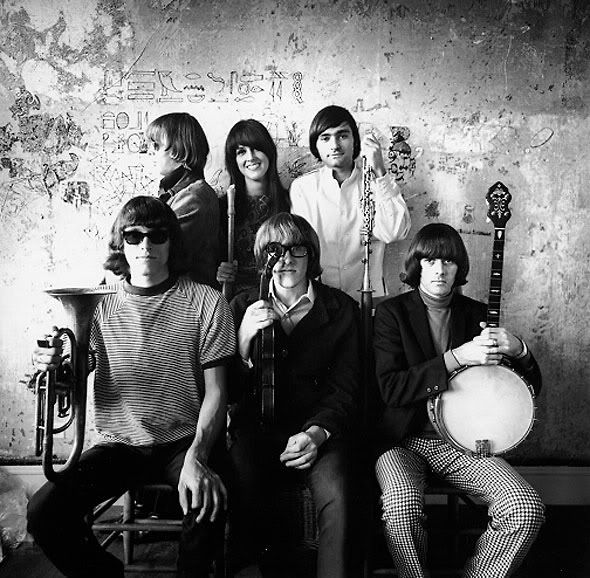
Awesome band,


Ahh the good old day's,



Jefferson Airplane is regarded as the most successful San Francisco band of the late 60s, despite countless personel and even name changes. The group was formed in August 1965 by guitarist Marty Balin, when he teamed up with guitarists Paul Kantner and Jorma Kaukonen, vocalist Signe Anderson, drummer Alexander ‘Skip’ Spence and bassist Jack Casady. Kantner was already a familiar face on the local folk circuit as was Balin, formerly of the Town Criers and co-owner of the Matrix club. The band soon became highly popular locally, playing gigs and benefits organized by promoter Bill Graham. Eventually they became regulars at the Fillmore Auditorium and the Carousel Ballroom, both a short distance from their communal home in the Haight Ashbury district. With the San Francisco music scene in full blossom, record companies engaged in a bidding war for local talent, and Jefferson Airplane became one of the first to sign a major record contract with RCA for an unheard of sum of $25,000. As the year ended, the band, a mere four months old, began work on its first album.
Shortly after the release of their moderately successful debut LP, "Jefferson Airplane Takes Off", (#128 on the Billboard Hot 200) Skip Spence was fired for missing too many rehearsals and replaced by Spencer Dryden. Signe Anderson became pregnant and also departed. She was replaced in October 1966 by Grace Slick. (real name: Grace Barnett Wing) Slick was already well known with her former band, the Great Society, and brought two of their songs, 'White Rabbit' and 'Somebody To Love' to the Airplane. Both titles were on their second influential collection, "Surrealistic Pillow", and both became U.S. Top 10 hits. They have now achieved classic status as definitive songs from that era.

The band's reputation was enhanced by a strong performance at the legendary Monterey Pop Festival in 1967. This national success continued with the erratic "After Bathing At Baxters" and the brilliant "Crown Of Creation". The latter showed the various writers in the band maturing and developing their own styles. Balin's 'If You Feel', Kaukonen's 'Ice Cream Phoenix' and Slick's tragi-comic 'Lather' gave the record great variety. This album also contained 'Triad', a song their friend David Crosby had been unable to include on a Byrds album. They maintained a busy schedule and released a well-recorded live album, "Bless Its Pointed Little Head", in 1969. The same year, they appeared at another milestone in musical history: the Woodstock Festival. Later that year, they were present at the infamous Altamont Festival, where a group of Hells Angels killed a young spectator and attacked Balin.
Slick and Kantner had now become lovers and their hippie ideals and political views were a major influence on the album, "Volunteers". While it was an excellent album, it marked the decline of Balin's role in the band. Additionally, Dryden departed and the offshoot band, "Hot Tuna" began to take up more of Casady and Kaukonen's time. Fiddler "Papa" John Creach joined the band full-time in 1970, although he still continued to play with Hot Tuna. Kantner released a concept album, "Blows Against The Empire", bearing the name Paul Kantner And The Jefferson Starship. The 'Starship' consisted of various Airplane members, plus Jerry Garcia, David Crosby and Graham Nash. This majestic album was nominated for the science fiction Hugo Award. Slick, meanwhile, gave birth to a daughter, China, who later in the year graced the cover of Slick And Kantner's album, "Sunfighter".
Following a greatest hits selection titled, "The Worst Of Jefferson Airplane" and the departure of Marty Balin, the band released the cleverly packaged "Bark". Complete with brown paper bag, the album offered some odd moments, notably Slick's 'Never Argue With A German', sung in spoof German, and new drummer Joey Covington's 50s-sounding a cappella 'Thunk'. It also marked the first release on their own Grunt label. The disappointing "Long John Silver" was followed by a gutsy live outing, "30 Seconds Over Winterland".

Soon afterwards, Kantner and Slick separated; she moved in with Skip Johnson, the band's lighting engineer, and eventually married him. Later that year, Slick was regularly in the news when her drinking problems got out of control. "Spitfire and Earth" continued the band's success, although they had now become a hard rock outfit. Meanwhile, "Count On Me" became a U.S. number 8 hit and "Runaway" reached number 12 in 1978. That same year, Slick was asked to leave the band, only to be allowed to return when she dried out.
"Freedom From Point Zero" and the U.S. number 14 hit "Jane" at the end of 1979, bore no resemblance to the musical style towards which remaining original member Kantner had attempted to steer them. He suffered a stroke during 1980, but returned the following spring together with a sober Grace Slick. Both "Modern Times" (1981) and "Winds Of Change" (1982), sold well, although by now the formula was wearing thin. Kantner found his role had diminished and released a solo album later that year. He continued with the Airplane throughout the following year, although he was openly very unsettled.
Towards the end of 1984, Kantner performed a nostalgic set of old Airplane songs with Marty Balin's band, amid rumours of a Jefferson Airplane reunion. The tension broke in 1985 when, following much acrimony over ownership of the band's name, Kantner was paid off and took with him half of the group's moniker. Kantner claimed the rights to the name, although he no longer wanted to use the title, as his reunion with Balin and Casady in the KBC Band demonstrated.
In defiance, his former band performed as simply, "Starship", but by this time only Grace Slick remained as an original member, after the incredible changes of the previous few years. The new line-up added Denny Baldwin on drums and recorded 'Knee Deep In The Hoopla' in 1985, which became their most successful album. Two singles from the album, 'We Built This City' (written by Bernie Taupin ) and 'Sara', both reached number 1 in the USA.
The following year, they reached the top spot on both sides of the Atlantic with the theme from the film "Mannequin", with 'Nothing's Gonna Stop Us Now'. Their image was now of slick perpetrators of Adult Pop, performing immaculate music for the MTV generation (on which China Kantner was a presenter). Now, having gone full circle, Grace Slick departed in 1989 to join Kaukonen, Casady, Balin and Kantner to tour as the Jefferson Airplane.
The group was not well received by the record buying public and sensing that their popularity had slipped considerably, Casady and Kaukonen again re-formed Hot Tuna, and Kantner was left to rebuild his "Starship" after Grace Slick announced that she was leaving the music business.

Retirement, however has not been very kind to Slick. In 1993, her house overlooking Mill Valley golf course was gutted by a fire started by sparks from a gate being welded by Marin County workers. Lost in the fire was her personal collection of memorabilia and several studio tapes. Three firefighters were fired after they were caught stealing items from the scene.
In 1994, Grace was arrested at her new home in Tiburon, CA, for threatening police, who were investigating a report of gunfire. She was released on $7,000 bail and, after agreeing to a plea bargin, entered a detoxification programme to control a recurrance of her alcohol problem. Apparently, she had begun drinking again (after several years "dry") following the fire at her last home, and had decided on a bit of indoor target practice.
The same year brought further tradgedy when Papa John Creach died from pneumonia after suffering a heart attack during the Los Angeles Earthquake.
After "Starship" had run it's course in the early 90s, Kantner revived the 'Jefferson' Starship name and he hooked up with ex-companion Jack Casady, ex-Tubes drummer Prairie Prince, and alternating vocalists Signe Anderson (from the very first Airplane) and Darby Gould. Later on in 1992, Marty Balin rejoined.
The band began touring extensively and in 1995, Jefferson Starship released the live album, "Deep Space/Virgin Sky", a tribute album to Papa John. Since spring 1995, Diana Mangano took Anderson's place as the female vocalist of the group, and in May 1996, ex-Dixie Dregs keyboardist T Lavitz signed on.
In 1996, Jefferson Airplane were inducted into the Rock and Roll Hall of Fame in Cleveland. Grace Slick, unable to travel for medical reasons, declined the invitation to attend, and instead, sent a rude note containing many four-letter words.
In the next few years, the rest of Jefferson Starship toured extensively, both electric and acoustic. Their album "Windows of Heaven" was released in February, 1999, and in August, 2003, re-mastered versions of the first four Jefferson Airplane albums were issued.
The band, in its various forms and names, has performed over 700 concerts in 16 countries in their 35 years in existance.
In January, 2005, drummer Spencer Dryden passed away after a long battle with colon cancer.






Awesome band,

